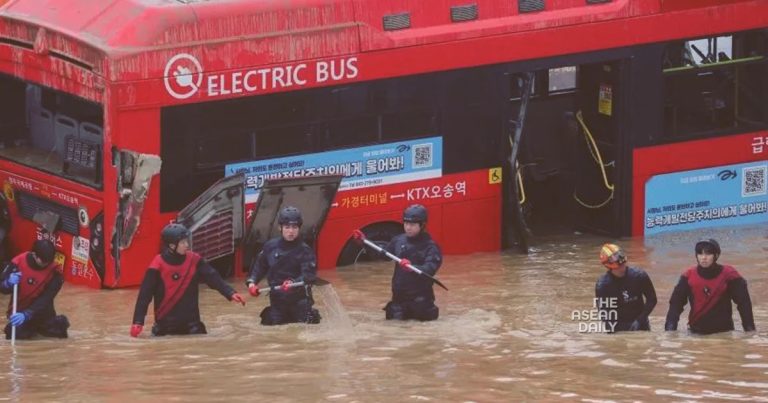18-7-2023 (SEOUL) Rescue workers have recovered the final body, concluding search operations at a flooded underpass in South Korea where more than a dozen people lost their lives. The incident has prompted multiple official investigations.
South Korea is currently experiencing its peak summer monsoon season, with days of relentless rain leading to widespread flooding and landslides. Rivers have overflowed, and reservoirs and dams are at capacity. More rain is expected in the coming days.
According to the interior ministry, heavy downpours have claimed the lives of 41 people across the country, with nine individuals still missing. Most of the fatalities were caused by landslides or individuals falling into flooded reservoirs.
Search and rescue operations at the 430-meter tunnel in Cheongju, North Chungcheong province, concluded on Monday evening after the recovery of the last body.
The tunnel was submerged on Saturday morning when floodwaters rushed in too rapidly for the trapped vehicles to escape. A total of 17 vehicles, including a bus, were caught in the tunnel, resulting in 14 fatalities, as reported by the interior ministry.
The tunnel will remain closed for additional inspections as part of the ongoing investigation into the cause of this tragic incident.
On Monday, the South Korean government and police launched separate inquiries into the tunnel flooding. President Yoon Suk-yeol attributed the loss of life to the mismanagement of danger zones.
The majority of casualties, including 19 fatalities and eight missing persons, were reported in North Gyeongsang province. Massive landslides in the mountainous region engulfed houses, resulting in the tragic loss of lives.
The Korea Meteorological Administration has forecasted heavy rainfall until Wednesday and urged the public to stay indoors and avoid unnecessary outings.
South Korea is accustomed to flooding during the summer monsoon season, but the country is typically well-prepared, resulting in a relatively low death toll. However, scientists warn that climate change has intensified and increased the frequency of extreme weather events worldwide.
Last year, South Korea experienced record-breaking rainfall and flooding, which claimed the lives of more than 11 people. Among the victims were three individuals who were trapped in a basement apartment in Seoul, reminiscent of the acclaimed Korean film “Parasite.” The government attributed the heavy rainfall to climate change, stating that it was the most severe recorded in Seoul’s 115-year weather history.




